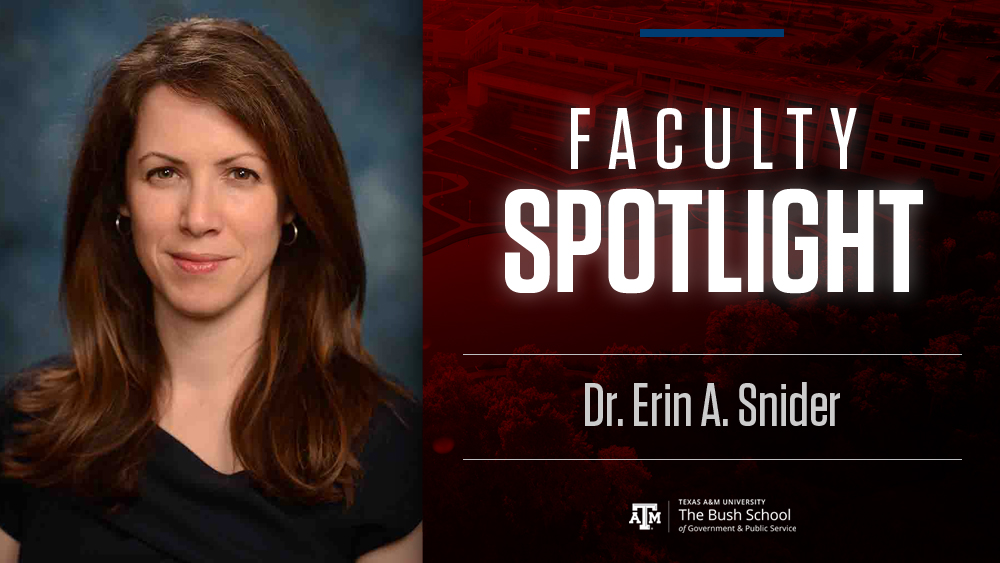
Assistant Professor Erin A. Snider joined the Bush School’s Master’s Program in International Affairs in the fall of 2013. She holds a PhD in politics and international studies from Trinity College, Cambridge, and focuses her research on democracy aid and the political economy of the Middle East, particularly Egypt. Her other degrees include an MSc in Middle East politics from the School of Oriental and African Studies at the University of London, and a BA summa cum laude from James Madison University.
“I am thrilled to be at the Bush School, where faculty are engaged in important scholarship that is affecting policy,” Snider said. “Bridging theory and practice is integral to my work, and it’s great to be at an institution that shares and values the same sentiment.”
Dr. Snider currently is working on a book based on her doctoral research, which looked at why democracy assistance to the Middle East does not seem to have made an impact in the region. Her other projects focus on the political economy of the Arab uprisings, an area that has not been explored much in the three years since the events began.
Dr. Snider’s interest in the region stems back to her childhood and her father’s return from serving in the US military in Turkey. Since then, she has spent much time researching and traveling between the US and the Middle East, particularly Egypt and Morocco. She was doing research in Egypt as the Arab Spring unfolded in early 2011.
“It was incredibly thrilling to be there at that time,” Snider said. “I hope that experience can illuminate my teaching and motivate my students to immerse themselves in the grey areas of the transitions. I also hope I can convey the complexities underlying change in the region and get them to wrestle with the new political challenges emerging in the Middle East,” she added. Still, as a researcher, Snider says it can be hard to work in the region when focusing on sensitive issues like politics. Research can be frustrating at times, she added, but enormously rewarding.
Snider said that public education has been really important in her family and that she is inspired by her grandfather, who was a professor at the University of Oklahoma.
When it comes to her teaching, Snider said she believes it should be interactive and dynamic. This includes student-led seminar-style classes and guest speakers who join via Skype, adding context and nuance to the subject at hand. “I try to relay the passion I have for the subjects I am teaching. I hope it is infectious. It is incredibly rewarding to share what I am learning with students that are interested in both development and the Middle East.”
Dr. Snider’s research interests include international relations of the Middle East, comparative politics, foreign assistance and international security, democratization, and US foreign policy. She has published in the journal Middle East Policy and has a book manuscript in progress: Technocrats, Bureaucrats, and Democrats: The Political Economy of US Assistance for Democracy in the Middle East.
Dr. Snider’s experience also includes working for the US State Department as well as the UN Association, focusing on the issue of landmines. That effort provided her an opportunity to travel to Afghanistan, which she says was a transformative experience and inspired her research on the political challenges of foreign assistance.
Most recently, she was a postdoctoral fellow in regional political economy (Middle East) at the Niehaus Center for Globalization and Governance, part of the Woodrow Wilson School of Public and International Affairs at Princeton University. While at Cambridge, Dr. Snider was a Gates Scholar, supported by the Bill and Melinda Gates Foundation. In 2007-2008, she held a Fulbright Fellowship to study Arabic at the American University in Cairo’s Arabic Language Institute.
Snider says she and her husband have had a wonderful first six months in the area and have really enjoyed being here. Apart from research, Snider enjoys traveling, reading, music, and collecting textiles from the Middle East.
